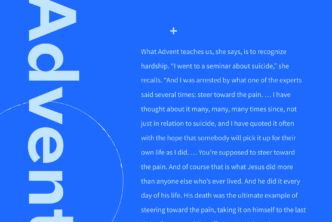Twenty-five years ago, singer-songwriter Rich Mullins lost his life in a car accident on his way to a benefit concert in Kansas. We remember him from hit songs like “Awesome God” and “Sing Your Praise to the Lord.”
At the peak of his career, Mullins turned his back on fame and success to live on a Native American reservation in New Mexico, teaching music to children and sharing his simple hope in the gospel of Jesus.
But who really was the enigmatic performer whose bold honesty ruffled the feathers of the music industry—and his fellow believers?
We get to know him better in Rich Mullins: A Ragamuffin’s Legacy. In this documentary, those who knew him best remember his lasting influence and how his deep devotion shaped their lives.
Here are eight things you might not know about Rich Mullins.
1. Rich Mullins struggled with “fitting in”
Friends said he was a complicated mix of talent and magnetism, piety and mystery. “Every single place he went,” recalled one, “he created community.” Yet those same friends sensed a lingering loneliness, as if he was never fully a part of the communities that grew around his popularity.
2. He was a piano prodigy
He began playing the piano at age 4, practicing in their rural Indiana church and picking up tunes in between his sister’s piano lessons. He always wanted to add his own flourishes to the music as written.
3. He couldn’t change a light bulb
In a part of the country where sports ability and mechanical savvy were highly valued, Rich was the artistic one. “He literally could not change a light bulb,” said his sister. “He was incapable.”
4. Rich’s compassion made him different
At about age six, Mullins announced he wanted to be a missionary. And from an early age, he was known for his caring heart. His brother shared that when they watched John Wayne movies, Mullins would cry if Indians were shot.
5. The family pastor challenged him to think
During their years in Indiana, the Mullins family’s pastor challenged them to read Scripture for themselves as he preached. He insisted they not take his word for it, but look for context in verses before and after sermon texts. Years later, Mullins said the Bible “does not give us answers fitted to our small-minded questions, but truth that goes beyond what we even know to ask.”
6. He struggled with the spotlight
After the first time he played the piano in church (around age 10), Rich was asked how he thought he did. “Pretty well,” he replied. “People seemed to enjoy it. They clapped.” He was promptly told that if people clapped for his performance, he did not point them to God. That early influence helped shape his later ministry.
7. Rebellion marked his early life
Mullins was known to skip school, and one day his high school administrators called home to ask where he was. His mother replied that he had left on time; she assumed he was in class. But then she knew where he was: at the local Methodist church, playing music. Of course.
8. College friends gave Rich a boost
Mullins got his performing start with a Christian band called Zion, playing at coffeehouses, high schools, and youth group gatherings in the Cincinnati area. As he preached between songs, the group grew into a ministry. Many of his Zion friends would remain with him the rest of his life.
“During his life, Rich Mullins challenged the sensibilities of what it means to follow Jesus in today’s world,” said James Bryan Smith, a professor and author who wrote a biography on Mullins. “And now in his death, he challenges all to build upon his legacy of joy, compassion, brokenness, unblinking honesty, and wonder of an Awesome God.”1
- James Bryan Smith, Rich Mullins: An Arrow Pointing to Heaven (Nashville, TN: B&H Publishing, 2000), title page.




